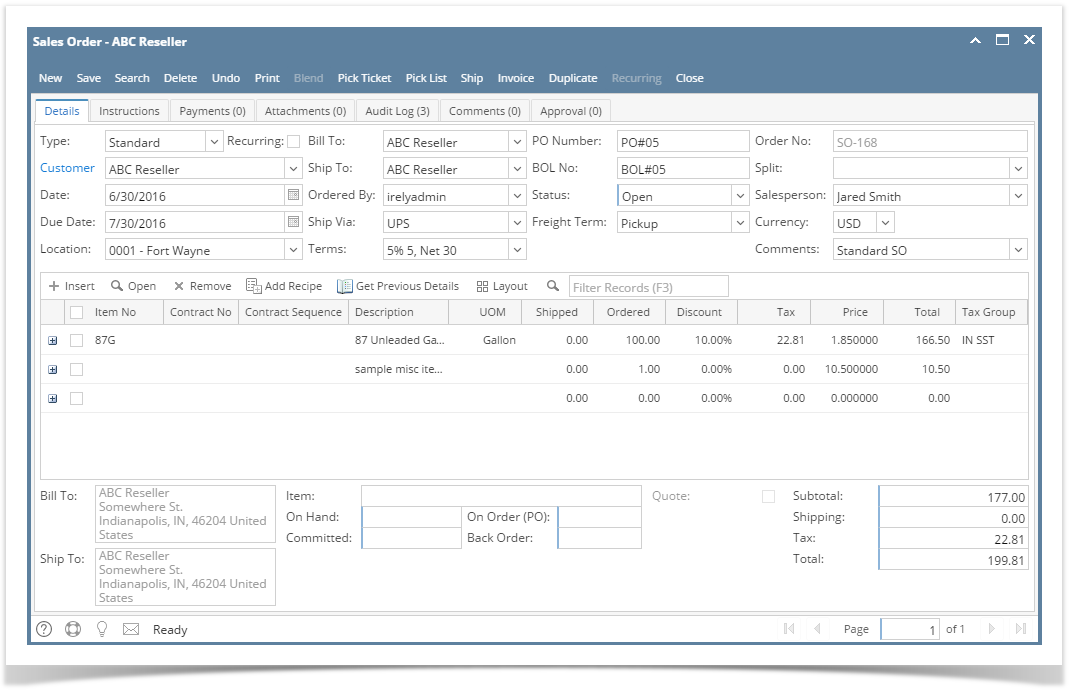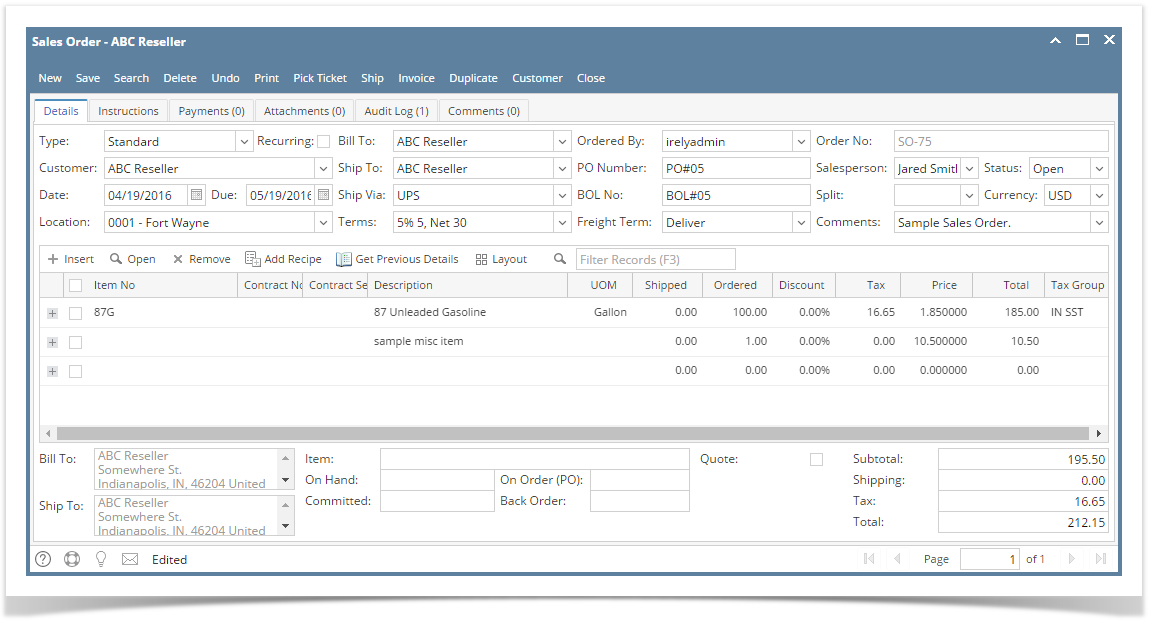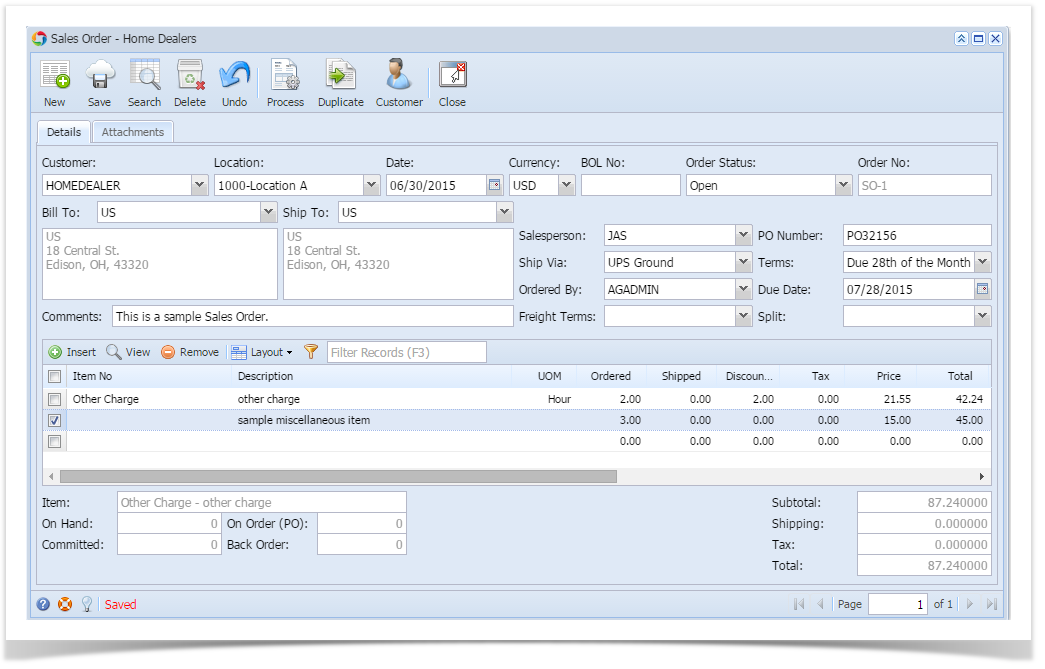Below are the steps in creating a standard Sales Order.
- Open the Accounts Receivable > Activities > Sales Order Sales | Sales Orders menu. If there is no existing record yet, this will open a new Sales Order screen and then proceed to step 3. If there are existing record, this will open the Search Sales Order screen. If the search screen is displayed, proceed to step 2.On search screen, click the New toolbar button to open a new Sales Order screen. . If not, click the New button on the integrated search grid.
You will notice that some of the fields, like the Type, Date, Due Date, Location, Ordered By, Status, and Currency are already populated by default. You can still change these value if necessary. - Fill out the header details as needed. The required details are Customer, Location, Bill To, Ship To, Terms, and Currency.
- Type is already set to Standard by default. Leave it as is.
- Select the Customer to whom the order is from.
- Select a different Location, Bill To, Ship To, Terms, and Currency if needed. But don't leave these fields blank.
- Enter other details that you see necessary. Refer to Sales Order | Field Description | Header Details to help you in filling out the fields.
- Add details on grid. Refer to Sales Order | Field Description | Grid Details to help you in filling out the fields. Note that UOM is a required detail.
Complete filling in the Item No, Ordered, Price, and other fields necessary to ensure they are appropriate for the customer's order.
 Image Added
Image Added
The grid will also allow you to enter miscellaneous items that do not have an Inventory Item record. You can do this by not selecting an Item No and simply entering its Description, Ordered, Price, and other necessary details.
 Image Added
Image Added Click Save button. Notice that the Order No field will be filled in with a unique and system generated number.
Here is a sample Sales Order.
 Image Added
Image Added
| Expand |
|---|
|
Below are the steps in creating a Sales Order. - Open the Sales | Sales Orders menu. If there is no existing record yet, this will open a new Sales Order screen. If not, click New button on the integrated search grid.
You will notice that some of the fields, like the Type, Location, Date, Due, Ordered By, Status, and Currency are already populated by default. - Fill out the header details as needed. Refer to Sales Order | Field Description | Header Details to help you in filling out the fields. Note that the required details are Customer, Location, Bill To, Ship To, Terms, and Currency.
- Add details on grid. Refer to Sales Order | Field Description | Grid Details to help you in filling out the fields. Note that UOM is a required detail.
Complete filling in the Item No, Ordered, Price, and other fields necessary to ensure they are appropriate for the customer's order.
 Image Added Image Added
The grid will also allow you to enter miscellaneous items that do not have an Inventory Item record. You can do this by not selecting an Item No and simply entering its Description, Ordered, Price, and other necessary details.
 Image Added Image Added Click Save button. Notice that the Order No field will be filled in with a unique and system generated number. Here is a sample Sales Order.  Image Added Image Added
|
| Expand |
|---|
|
- Open the Sales | Sales Orders menu. If there is no existing record yet, this will open a new Sales Order screen. If not, click New button on the integrated search grid.
 Image Added Image Added
You will notice that some of the fields, like
|
...
- the Type, Location, Invoice Date, Due,
|
...
...
- Status, and Currency are already populated by default
|
...
- .
- Fill out the header details as needed. Refer to Sales Order | Field Description | Header Details to help you in filling out the fields. Note that the required details are Customer, Location, Bill To, Ship To, Terms, and Currency.
- Add details on grid. Refer to Sales Order | Field Description | Grid Details to help you in filling out the fields. Note that UOM is a required detail.
Complete filling in the Item No, Ordered, Price, and other fields necessary to ensure they are appropriate for the customer's order.
 Image Added Image Added
The grid will also allow you to enter miscellaneous items that do not have an Inventory Item record. You can do this by not selecting an Item No and simply entering its Description, Ordered, Price, and other necessary details.
 Image Added Image Added Click Save button. Notice that the Invoice No field will be filled in with a unique and system generated number. Here is a sample Sales Order.
 Image Added Image Added
|
| Expand |
|---|
|
- Open the Sales | Sales Orders menu. If there is no existing record yet, this will open a new Sales Order screen.
- On the grid search, click the New toolbar button to open a new Sales Order screen. You will notice that some of the fields, like the Location, Date, Currency, and Order Status, are already populated by default.
- Enter the header details as needed. Refer to Sales Order | Field Description | Header Details to help you in filling out the fields.
- Enter the grid details as needed. Complete filling in the Item No, Ordered, Discount, and other fields necessary to ensure they are appropriate for the customer's order.
 Image Added Image Added
The grid will also allow you to enter miscellaneous items that do not have an Inventory Item record. You can do this by not selecting an Item No and simply entering its Description, Ordered, Discount, and Price. Refer to Sales Order | Field Description | Grid Details to help you in filling out the fields.
 Image Added Image Added Click Save button. Notice that the Order No field will be filled in with a unique and a system generated number. The Customer, Location, Bill To, Ship To, and Terms are the required details in saving a Sales Order. Here is a sample Sales Order.
 Image Added Image Added
|
...
| Expand |
|---|
|
Below are the steps in creating a Sales Order. - Open the Accounts Receivable > Activities > Sales Order menu. If there is no existing record yet, this will open a new Sales Order screen and then proceed to step 3. If there are existing record, this will open the Search Sales Order screen. If the search screen is displayed, proceed to step 2.
- On the search screen, click the New toolbar button to open a new Sales Order screen. You will notice that some of the fields, like the Order Type, Location, Date, Currency, and Order Status, are already populated by default.
- Enter the header details. A list of the Details tab > Header fields is listed in
|
- Sales Order.
- Enter the grid details. Complete filling in the Location, Item No, Ordered, Discount, and other fields necessary to ensure they are appropriate for the customer's order. Note that before selecting an Item No, you need to
|
...
...
...
- to filter the items per location.
|
...
 Image Added Image Added
The grid will also allow you to enter miscellaneous items that do not have an Inventory Item record. You can do this by not selecting an Item No and simply entering its Location, Description, Ordered, Discount, and Price. A list of the Details tab > Grid Details is listed in Sales Order.
 Image Added Image AddedClick Save button. Notice that the Order Number field will be filled in with a unique and a system generated number.
|
...
| Note |
|---|
You can skip saving the record if the transaction is to be |
|
...
...
Here is a sample Sales Order.
 Image Added Image Added
|













